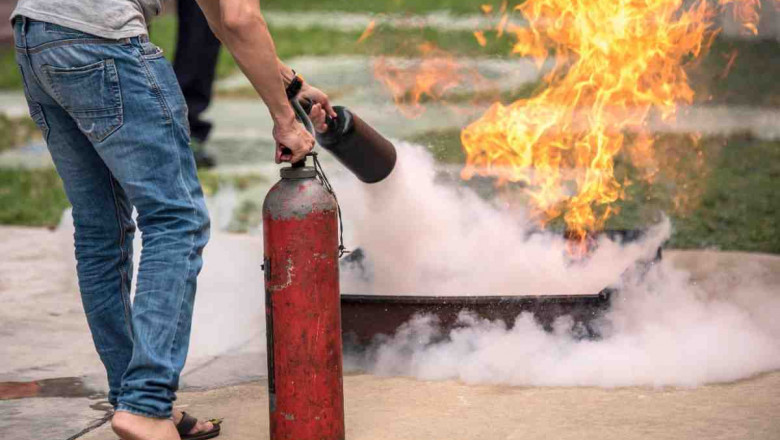views
When it comes to fire safety, owning a fire extinguisher is not enough. Whether you're protecting your home, office, or commercial space, the equipment you purchase needs to be compliant with the latest fire codes and standards. If you’re exploring fire extinguisher sales, it’s important to understand what “up to code” really means—and why it matters.
In this post, we’ll break down the essentials you need to know before you buy a fire extinguisher. We’ll also cover compliance standards, types of extinguishers, maintenance requirements, and tips to ensure you're making a smart, safe purchase.
Why Fire Code Compliance Matters
Fire extinguishers are regulated by national and local codes to ensure they function properly in emergencies. Compliance isn't just about safety—it's also about avoiding fines, legal issues, and insurance problems. If you own a business, the Occupational Safety and Health Administration (OSHA) and National Fire Protection Association (NFPA) set clear guidelines for placement, inspection, and use of extinguishers.
If you’re a homeowner, your local fire department may still have rules for the type and location of fire extinguishers in residential spaces.
Understanding the Basics: Fire Extinguisher Classes
Before you jump into fire extinguisher sales, make sure you know what type you need. Not all fires are the same, and using the wrong extinguisher can make the situation worse.
Here are the five primary classes:
-
Class A: For ordinary combustibles like wood, paper, and fabric
-
Class B: For flammable liquids like gasoline, oil, and paint
-
Class C: For electrical fires (energized equipment)
-
Class D: For flammable metals (mainly industrial use)
-
Class K: For kitchen fires involving grease, oils, and fats
Most homes and small businesses benefit from ABC-rated extinguishers, which cover the most common fire types.
What to Look for During Fire Extinguisher Sales
When buying a fire extinguisher, consider the following to ensure it meets code:
1. UL Listing or Certification
Make sure the extinguisher is UL (Underwriters Laboratories) listed or approved by a recognized testing agency. This certification confirms the extinguisher has passed safety and performance standards.
2. Label Visibility
The label should clearly show the fire classes it covers (A, B, C, etc.), operating instructions, and maintenance requirements. In commercial settings, unclear or missing labels can result in code violations.
3. Rechargeable vs. Disposable
-
Rechargeable extinguishers cost more upfront but can be refilled after use or inspection.
-
Disposable extinguishers are one-time use and must be replaced after discharge or expiration.
Most commercial buildings are required to use rechargeable extinguishers.
4. Pressure Gauge
Always check the gauge. The needle should be in the green zone, indicating that the unit is charged and ready for use. An extinguisher showing low pressure is non-compliant and unsafe.
Placement and Quantity Requirements
Code compliance isn’t just about the extinguisher itself—it also involves where and how many you have.
Residential Guidelines:
-
At least one extinguisher per floor
-
One in the kitchen and garage
-
Mount on walls between 3.5–5 feet off the ground
-
Easily accessible, not blocked by furniture
Commercial Guidelines (based on NFPA 10):
-
No more than 75 feet of travel distance to an extinguisher
-
Appropriate size and class based on the fire risk of the area
-
Wall-mounted with clear signage
-
Monthly visual inspections and annual professional maintenance
Always check with your local fire marshal or authority having jurisdiction (AHJ) for specific requirements.
Regular Inspection and Maintenance
Even the best fire extinguisher can fail if it’s not properly maintained. If you’re purchasing one, especially through commercial fire extinguisher sales, ask about inspection and maintenance services.
Here’s what you need to do:
-
Monthly Visual Check: Ensure the gauge is in the green, tamper seal is intact, and no signs of corrosion or damage.
-
Annual Professional Inspection: A certified technician should inspect and tag each unit yearly.
-
Hydrostatic Testing: Required every 5, 6, or 12 years depending on the type. This checks the structural integrity of the cylinder.
Expired or damaged units must be serviced or replaced to stay in compliance.
Common Mistakes to Avoid When Buying
-
Buying an extinguisher without checking the manufacturing date
Many extinguishers have a 5–15 year shelf life. Don’t buy something that’s already halfway to expiration. -
Purchasing the wrong type for your environment
A Class A extinguisher won’t help in an electrical fire. Match the extinguisher to your space. -
Ignoring local codes
Even if the extinguisher meets national standards, it may not comply with your state or city regulations. -
Storing extinguishers improperly
Units kept in garages or outdoors must be rated for temperature extremes and protected from the elements.
Final Thoughts: Shop Smart, Stay Safe
Whether you’re a homeowner preparing for emergencies or a business owner ensuring workplace safety, understanding what it means for a fire extinguisher to be "up to code" is essential. Fire extinguisher sales are not just about grabbing the cheapest option off the shelf—they're about investing in reliable, code-compliant protection.
Before you buy, make sure your extinguisher is properly rated, certified, inspected, and suitable for your environment. It's a small investment that could save lives, property, and peace of mind.
Need help with fire extinguisher sales or inspection?
Contact a certified local provider who can guide you through selection, compliance, and ongoing maintenance. Fire safety is serious business—buy smart and stay safe!














Comments
0 comment